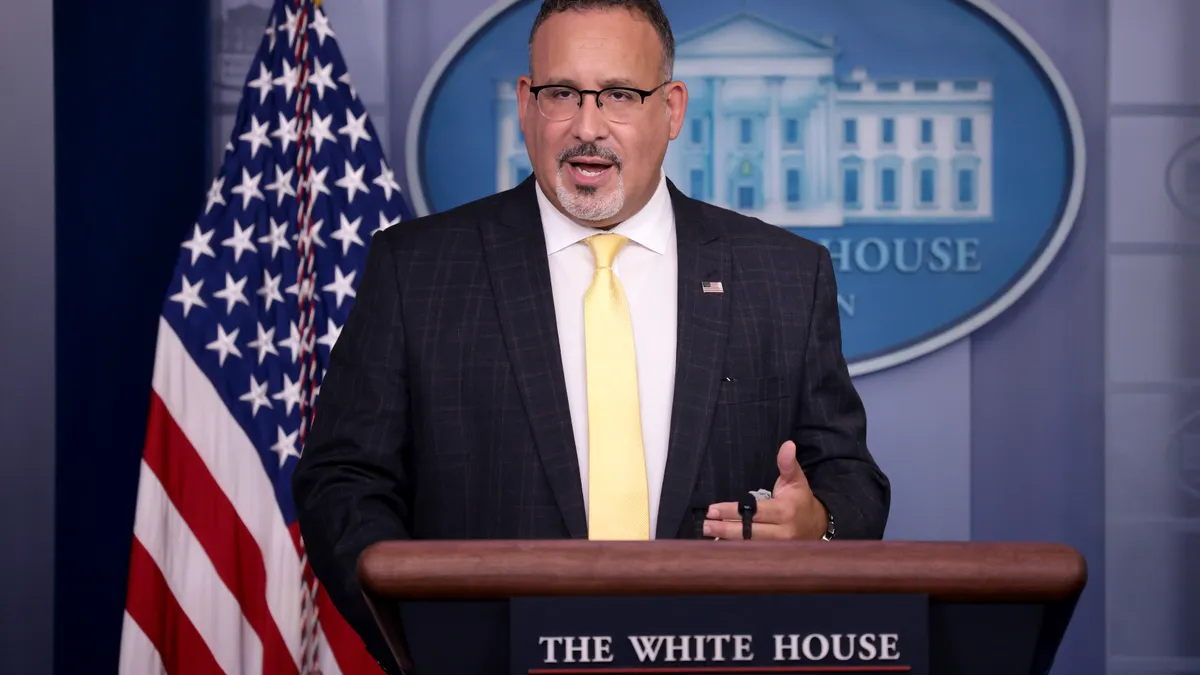The U.S. Department of Education's Title IX rule finalized this month immediately fractured the education community, with conservative leaders gearing up to challenge the regulations and liberal lawmakers lauding their arrival.
"Our nation's educational institutions should be places where we not only accept differences, but celebrate places that root out hate and promote inclusion," said U.S. Secretary of Education Miguel Cardona during a press briefing the day before the rule's April 19 release. "Not just because it's the right thing to do, but because our systems and institutions are richer for it."
The controversial regulations for the first time protect students and employees based on their LGTBQ+ identities as well as on pregnancy-related medical conditions under the law barring sex discrimination in federally funded education programs.
Until now, interpreting Title IX to include LGBTQ+ students had ping-ponged three times in just as many administrations, with each administration undoing the prior one's work. Cementing these protections in the latest regulations rather than allowing them to remain as interpretations — which are much more easily undone — means walking them back would be a much lengthier process.
Resistance begins
In the meantime, however, opponents of the rule are already gearing up to dismantle it.
The rule "re-imagines Title IX to permit the invasion of women's spaces and the reduction of women's rights in the name of elevating protections for 'gender identity,' which is contrary to the text and purpose of Title IX," said May Mailman, director of the Independent Women's Law Center, in a statement.
The IWLC, and other conservative individuals or groups, say the rule infringes on women's rights by giving transgender students an unfair advantage on female sports teams. "Because this is illegal, we plan to sue," said Mailman, adding that her organization has joined a coalition of others challenging the rule.
However, the rule explicitly leaves open the question of how Title IX applies to athletic teams, saving that instead for a separate rulemaking that the department kicked off some nine months after proposing the broader Title IX rule. The Title IX athletics rule — which has yet to be finalized — would set a framework for when transgender students can play on sports teams aligning with their gender identities and prohibit blanket transgender athlete bans.
Nonetheless, the overall pushback to the broader rule was expected, considering the rule had garnered opposition long before it was even proposed in June 2022 .
Nearly 10 months prior to the proposal's release, 20 mostly conservative states successfully sued the Education Department seeking to block its interpretation that gay and transgender people are protected under the sex discrimination law.
Then, just prior to the proposed rule's release, 15 Republican state attorneys general warned they would sue if the department didn't scrap its efforts to rewrite Title IX regulations.
Now that the final rule enshrining protections for LGBTQ+ individuals has been released, pushback from state leaders is intensifying. The rule, which is to be published in the Federal Register any day, gives schools and colleges until Aug. 1 to comply.
In an April 22 letter from Louisiana State Superintendent Cade Brumley advised district leaders and school boards in the state not to alter their policies or procedures related to Title IX. "It is inevitable that there will be a legal challenge to the new rules, contesting the unprecedented unilateral expansion of the long-standing prohibition against discrimination based on 'sex' to include 'sex stereotypes, sex related characteristics (including intersex traits) pregnancy or related conditions, sexual orientation and gender identity,'" Brumley wrote.
"At this time, my opposition to these new Title IX rules remains unchanged," said Brumley. "The Title IX rule changes recklessly endanger students and seek to dismantle equal opportunities for females."
Other conservative states that have told their districts to disregard the final rule include Montana, Florida, Oklahoma and South Carolina.
Some lawmakers and federal officials have also lambasted the final rule
Rep. Virginia Foxx, chairwoman of the House Committee on Education and the Workforce, said in a statement the rule puts Title IX "squarely on the chopping block."
"This final rule dumps kerosene on the already raging fire that is Democrats’ contemptuous culture war that aims to radically redefine sex and gender," said Foxx, a Republican from North Carolina.
Foxx, and others who resist the rule, say it undermines due process rights and violates women's rights by protecting LGBTQ+ students from sex discrimination.
"Evidently, the acceptance of biological reality, and the faithful implementation of the law, are just pills too big for the Department to swallow – and it shows,” Foxx said.
Supporters push for athletics rule
On the other side, however, the rule drew an outpouring of support from Democratic federal lawmakers and LGBTQ+ civil rights organizations.
Rep. Bobby Scott, the ranking member on Foxx's committee, called the rule in a statement "a monumental step" that "restored the intent of Title IX."
"By expanding the critical protections under this law, the new regulations would help ensure that all students, including LGBTQI+ students, are fully protected from discrimination based on sex, sexual orientation, and gender identity," said Scott.
Some civil rights organizations likewise celebrated the rule for its LGBTQ+ protections.
However, some have taken issue with various provisions.
The American Civil Liberties Union, for example, opposes universities allowing a single-investigator model, which the Biden administration restored after a ban under the Trump administration. Many K-12 educators and advocates pushed for the single-investigator model, as it allows a single person to investigate a Title IX complaint and decide the investigation's outcome — something the department acknowledged in its rule may be easier for schools with smaller staffs.
ACLU said it supports a variety of other portions of the rule, such as including LGBTQ+ students in its protections and saying that pregnancy discrimination includes discrimination based on lactation.
Other organizations, while praising the administration for the final rule, are continuing to push for the administration to release its final Title IX athletic rule setting the framework for transgender students to participate on sports teams.
The Education Department has failed to meet its own deadline for releasing that final regulation, which garnered 154,000 comments from the public, compared with 240,000 for the Title IX rule released last week. The department has yet to pass the athletics rule to the Office of Management and Budget, which gets up to 90 days for review, along with an option to extend that by another 30 days if needed.
The department said in a call with reporters last week that the athletic rulemaking process, which kicked off nine months after the broader Title IX rule, "is still ongoing."
"While we celebrate the significance of this moment," said Shiwali Patel, senior counsel for the National Women's Law Center, "we are still urging the administration to release a final rule that explicitly clarifies what Title IX has always stood for and guarantees — that transgender, nonbinary, and intersex athletes have a right to play sports alongside their peers."





















